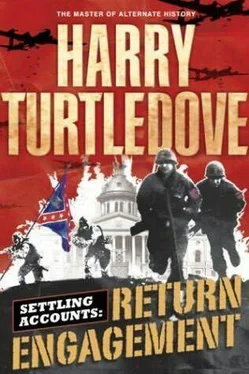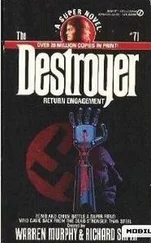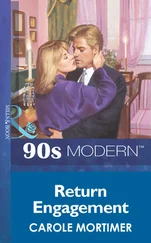Harry Turtledove - Return engagement
Здесь есть возможность читать онлайн «Harry Turtledove - Return engagement» весь текст электронной книги совершенно бесплатно (целиком полную версию без сокращений). В некоторых случаях можно слушать аудио, скачать через торрент в формате fb2 и присутствует краткое содержание. Жанр: История, на английском языке. Описание произведения, (предисловие) а так же отзывы посетителей доступны на портале библиотеки ЛибКат.
- Название:Return engagement
- Автор:
- Жанр:
- Год:неизвестен
- ISBN:нет данных
- Рейтинг книги:5 / 5. Голосов: 1
-
Избранное:Добавить в избранное
- Отзывы:
-
Ваша оценка:
- 100
- 1
- 2
- 3
- 4
- 5
Return engagement: краткое содержание, описание и аннотация
Предлагаем к чтению аннотацию, описание, краткое содержание или предисловие (зависит от того, что написал сам автор книги «Return engagement»). Если вы не нашли необходимую информацию о книге — напишите в комментариях, мы постараемся отыскать её.
Return engagement — читать онлайн бесплатно полную книгу (весь текст) целиком
Ниже представлен текст книги, разбитый по страницам. Система сохранения места последней прочитанной страницы, позволяет с удобством читать онлайн бесплатно книгу «Return engagement», без необходимости каждый раз заново искать на чём Вы остановились. Поставьте закладку, и сможете в любой момент перейти на страницу, на которой закончили чтение.
Интервал:
Закладка:
He bumped to a landing. The strip had been cleared in a tearing hurry, and was a long way from smooth. As soon as he got out of his fighter, groundcrew men pushed it off towards a camouflaged revetment. If a bomb hit it, fire wouldn't spread to any other aircraft.
Camouflage netting also concealed the tents where pilots slept and ate and drank, not necessarily in that order. The heavy leather clothes that had kept him warm three miles up in the sky were stifling in August on the ground. He unfastened toggles and unzipped zippers as fast as he could. (He remembered from the Great War that he would be glad to have such gear when winter rolled around, assuming he was still alive by then.)
Twilight seemed to close in around him when he ducked under the netting. He trudged wearily to the headquarters tent. It was even gloomier inside there, which perfectly suited his mood. Another major, a knobby-cheeked Irishman named Joe Kennedy, Jr.-he insisted on the Junior-was doing paperwork by the light of a kerosene lamp. He was a boy wonder, half Moss' age, the son of a Boston politico. That went a long way towards accounting for his rank, but he could fly. He'd already shot down three Confederate airplanes-and, as the bandages on his left arm showed, been shot down himself. Till the burns healed, he was grounded.
He looked up and nodded to Moss. "How'd it go?" he asked, a New England accent broadening his vowels.
"Got myself a Mule," Moss answered. "Our own antiaircraft was doing its goddamnedest to shoot me down. So was a Hound Dog. We were a match-neither one of us could get the drop on the other. Finally we both gave up and went home. How about you, Joe? How's the arm?"
"Hurts a little," Kennedy admitted. He dry-swallowed a couple of small white pills. They were codeine, not aspirin; he hadn't graduated to aspirin yet. Moss suspected his arm hurt more than a little, but he didn't bitch about it. No matter how he'd got his rank, he seemed to be doing his best to deserve it. After the pills went down, he asked, "How's Sandusky look?"
"Kicked flat and then stomped on," Moss said. "It's not going to hold, and life gets a hell of a lot more complicated when it falls."
"Yeah." Joe Kennedy, Jr., nodded. "You should hear my old man go on about Al Smith. Two Irishmen, two Catholics-but it doesn't matter a hill of beans, not as far as Dad's concerned. He's a Democrat and Smith's a Socialist, and that's what really counts."
Moss only grunted. "Far as I can see, how we got into this mess stopped mattering as soon as the shooting started. Now we've got to get out of it the best way we can."
"Makes sense to me," Kennedy said mildly; even though his father was at least a medium-sized wheel back in Boston, he didn't try to ram his own politics down anybody else's throat.
Come to that, Moss wasn't precisely sure what the younger Kennedy's politics were. He didn't ask now, either. Instead, he said, "What's new out of Utah?"
Kennedy's face twisted with a pain that had nothing to do with his injury. "It's as bad as it was in the last war," he said, swallowing that final consonant. "The Mormons are up in arms, all right. Governor Young's run for Colorado." More r's vanished, while one appeared at the end of the state's name.
"What are we going to do about those bastards?" Moss aimed the question at least as much at himself, or perhaps God, as at Joe Kennedy, Jr.
But Kennedy had an answer. His face went hard and ruthless as he said, "Bomb them, shoot them, blow them up, and hang the ones that are left. Smith was nice to them, same as he was nice to Featherston. He thought that was all it took. Just be nice, and everybody'd love you and do what you wanted. It's really worked out great, hasn't it?"
"I think it's a little more complicated than that, at least with the Mormons," Moss said. "Utah's been a mess longer than I've been alive. It didn't start with the Great War."
"They got one bite then." Kennedy waved complications away with his good arm; he didn't want to hear about them. "That's what you give a mean dog-one bite. If it bites you again, you get rid of it."
"Shall we do the same for the Confederates?" Moss' voice was dryly ironic. He had no more use for simplicity than Kennedy did for complexity.
The younger man refused to acknowledge the sarcasm. "We'd better, don't you think? They'd get rid of us if they had the chance. The way things are going, they think they do. I happen to think they're full of shit. I don't suppose you'd be wearing the uniform if you didn't feel the same way. But if we can beat them, they'd better not get another chance to do this to us. If they do, we deserve whatever happens to us afterwards, wouldn't you say?"
"If you think occupying Canada's been expensive, occupying the CSA'd be ten times worse," Moss said.
"Maybe." Kennedy shrugged, then bit his lip; the pain pills must not have kicked in. "Maybe you're right. But if occupying the Confederate States will be expensive, how expensive will not occupying them be?"
He had no give in him. He wanted the United States to have no give in them, either. Moss said, ", 'They make a desert and call it peace,' eh?"
Kennedy recognized the quotation. Moss had figured his education included Latin. Kennedy said, "Tacitus was a stiff-necked prig who didn't like anything the Roman government did. The Romans might have made a desert out of Britain, but they hung on to it for the next four hundred years after that."
"Have it your way." Moss was too weary to argue with him. "What I could use right now is a drink"-or three, he added to himself-"and then some sack time."
"Go ahead." Kennedy jerked his thumb toward the tent that held what passed for the officers' club. "I've got to finish this crap first." He attacked the paperwork.
In the Great War, pilots had drunk as if there were no tomorrow. For a lot of them, there hadn't been. This time around, men seemed a little more sober. Maybe they were thinking more about what they were doing. Moss' chuckle came sour. If people really thought about what they were doing, would they have started wars in the first place?
Instead of bar stools, the officers' club had metal folding chairs that looked as if they'd been liberated from an Odd Fellows' hall in Defiance. Moss wasn't inclined to be unduly critical. He sat down in one of them and called for a whiskey sour.
"Coming right up, sir," answered the soldier behind the bar, which was as much a makeshift as the seating arrangements. He brought the drink, then took fresh beers to a couple of fliers who already had a lot of dead soldiers in front of them.
Moss poured down half his drink. He hardly knew anybody else who flew out of this airstrip. He'd got acquainted with Joe Kennedy, Jr., in a hurry, because Kennedy liked to hear himself talk. Most of the others remained ciphers, strangers. Squadron organization hadn't held up well under the relentless pressure of the Confederate onslaught. Moss hoped victory had disrupted the enemy as much as defeat had disorganized the USA, but he wouldn't have bet on it.
He finished the whiskey sour and held up the glass to show he wanted another one. Two stiff drinks started to counter the adrenaline still coursing through him after his inconclusive duel with the Confederate fighter pilot. He got up and headed for his cot. Sleep seemed the most wonderful thing in the world.
He was deep underwater when C.S. bombers paid a call on Defiance. The roar of the antiaircraft guns around the field didn't wake him. When bombs started falling, though, he sat up and blearily looked around. He thought about going back to sleep again, but didn't. He got up and ran for a trench carrying his shoes; he was still wearing the rest of his clothes.
The airplanes overhead were Razorbacks, not Mules. They dropped their bombs from three miles up in the sky. That meant they mostly couldn't hit the broad side of a barn. Bombs fell on and around the airstrip almost at random. "We ought to scramble some of our fighters and shoot those bastards down," Moss called to Joe Kennedy, Jr., who sprawled in the trench about ten feet away.
Читать дальшеИнтервал:
Закладка:
Похожие книги на «Return engagement»
Представляем Вашему вниманию похожие книги на «Return engagement» списком для выбора. Мы отобрали схожую по названию и смыслу литературу в надежде предоставить читателям больше вариантов отыскать новые, интересные, ещё непрочитанные произведения.
Обсуждение, отзывы о книге «Return engagement» и просто собственные мнения читателей. Оставьте ваши комментарии, напишите, что Вы думаете о произведении, его смысле или главных героях. Укажите что конкретно понравилось, а что нет, и почему Вы так считаете.












